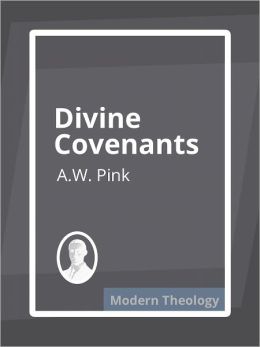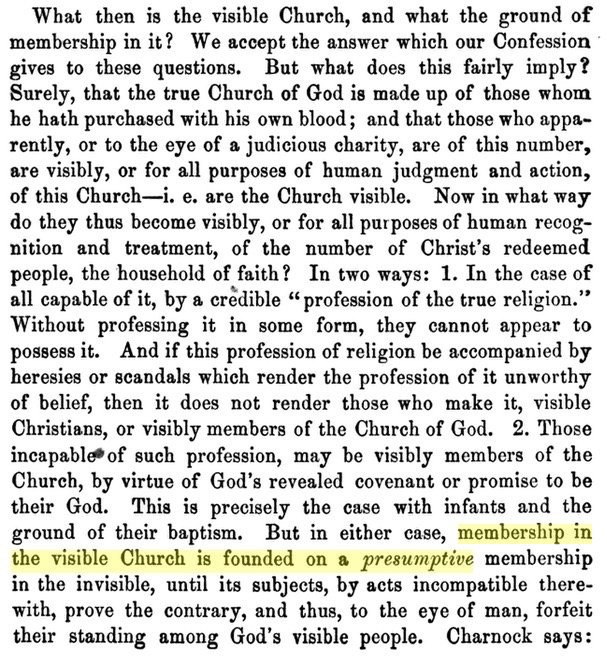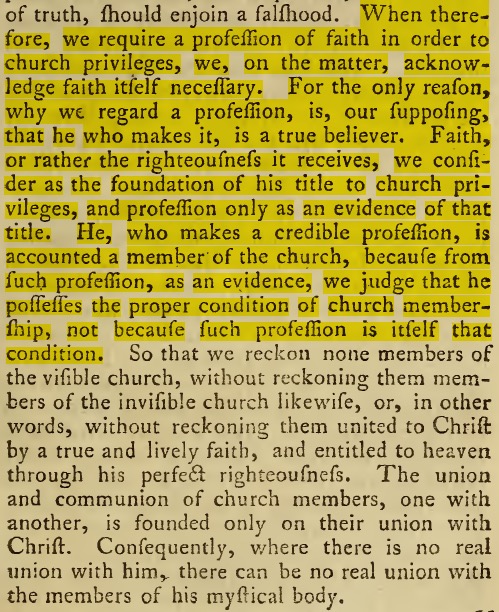Additional Resources
From the Garden to the Covenant of Works (Barcellos)
|
Pascal Denault on the Covenant Theology of the 1689 Baptist Confession (RB Seminary)
On 15, Nov 2014 | In Audio, Pascal Denault, Resources, Video | By Brandon Adams
From Reformed Baptist Seminary: Pascal Denault is an ordained minister of a Reformed Baptist church in Quebec and is the author of The Distinctiveness of Baptist Covenant Theology. In four video lectures below, Pascal discusses the covenant theology of the Second London Baptist Confession of 1689. First, he examines the “covenant of works” as it is formulated in the Westminster Confession, Savoy Declaration, and Second London Baptist Confession in lecture one. Next, in lecture two, he summarizes the “covenant of grace” as it has been traditionally formulated among Reformed and Paedobaptist theologians. In the third lecture, Pascal highlights the unique contribution offered by the Particular Baptists in the 2LBCF to a theology of the covenant of grace. Then he summarizes his study on the covenant theology of the 2LBCF and highlights the practical ramifications in lecture four. Finally, a Q&A session featuring Bob Gonzales and Pascal Denault deals with questions related to confessions of faith and covenant theology. Enjoy!
Pascal Denault is an ordained minister of a Reformed Baptist church in Quebec and is the author of The Distinctiveness of Baptist Covenant Theology. In four video lectures below, Pascal discusses the covenant theology of the Second London Baptist Confession of 1689. First, he examines the “covenant of works” as it is formulated in the Westminster Confession, Savoy Declaration, and Second London Baptist Confession in lecture one. Next, in lecture two, he summarizes the “covenant of grace” as it has been traditionally formulated among Reformed and Paedobaptist theologians. In the third lecture, Pascal highlights the unique contribution offered by the Particular Baptists in the 2LBCF to a theology of the covenant of grace. Then he summarizes his study on the covenant theology of the 2LBCF and highlights the practical ramifications in lecture four. Finally, a Q&A session featuring Bob Gonzales and Pascal Denault deals with questions related to confessions of faith and covenant theology. Enjoy!
The Covenant Theology of the 2LBCF, Part 1
The Covenant Theology of the 2LBCF, Part 1 – Pascal Denault from Reformed Baptist Seminaryon Vimeo.
The Covenant Theology of the 2LBCF, Part 2
The Covenant Theology of the 2LBCF, Part 2 – Pascal Denault from Reformed Baptist Seminaryon Vimeo.
The Covenant Theology of the 2LBCF, Part 3
Try here http://rbseminary.org/home/pascal-denault-on-the-covenant-theology-of-the-1689-baptist.html
The Covenant Theology of the 2LBCF, Part 4
Try here http://rbseminary.org/home/pascal-denault-on-the-covenant-theology-of-the-1689-baptist.html
Q&A – Gonzales and Denault on Confessions and Covenant Theology
Question & Answer Session: Confessions of Faith and Covenant Theology from Reformed Baptist Seminary on Vimeo.

From Pascal Denault’s website:
1689 Federalism is the Particular Baptist understanding of the Covenant of Grace as stated in the Second London Confession of Faith of 1689. This particular view is distinct from the Westminster view that holds to the concept of one Covenant of Grace under two distinct administrations which are the Old and the New Covenants. From this view, the Westminster Confession allows the Old Covenant to define the Covenant of Grace (its nature, its stipulations, its blessings) and end up with a Covenant of Grace that is mixed by nature because it includes the physical posterity of all those who profess faith. This understanding was perceived by the Particular Baptists to alter the nature of the New Covenant which is « not like » the Old Covenant (Jer. 31:32) and is pure by nature (Jer. 31:34).
The 1689 Confession rejects the One Covenant/Two administrations view of the Westminster. Instead, it affirms that the Covenant of Grace was only revealed in the Old Testament time until it became a formal covenant when the New Covenant was established. Therefore, the Particular Baptist understanding considers that only the New Covenant is the Covenant of Grace and defines it. This involves that the Old Covenant was not the Covenant of Grace and was only typologically linked to it but was in itself an earthly covenant that came to an end when the heavenly reality was established. Instead of seeing two realities (earthly/heavenly, internal/external) inside of the same covenant of grace, the 1689 Federalism affirms two distinct covenants: an earthly external covenant (the Old) and an heavenly internal covenant (the New). The New Covenant was first a promise that was put under the guard of the Law (the Old Covenant). It was then accomplished, sealed in the blood of Christ and given to believers in the form of a covenant.
In the lectures below, I expose chapter 7 of the 1689 (Of God’s Covenant). These lectures were given at the Reformed Baptist Seminary module on Creeds and Confessions held in Las Vegas October 2014. I offer here the MP3 files, the videos are available at RBS website: http://rbseminary.org/home/pascal-denault-on-the-covenant-theology-of-the-1689-baptist.html
You can find a French version of this teaching here: http://www.unherautdansle.net/alliances/
1. The Covenant of Works (7.1) – Audio MP3
2. The Covenant of Grace – Paedo view (7.2) – Audio MP3
3. The Covenant of Grace – Credo view (7.3) – Audio MP3
4. Summary and conclusions – Audio MP3
5. Q&A (Dr. Bob Gonzales and Pascal Denault) – Audio MP3
The Case for Credobaptism
On 04, Nov 2014 | In Resources, Samuel Renihan | By Brandon Adams
Place for Truth: A Voice of the Alliance of Confessing Evangelicals posted two articles recently. One arguing for paedobaptism, the other for credobaptism.
Samuel Renihan wrote an excellent summary of 1689 Federalism’s case for credobaptism. I highly recommend reading it, printing it, and saving it.
Consequently, there has never been a covenant wherein “believers and their children” constituted the paradigm for covenant membership.
Did A.W. Pink agree w/ 1689 Federalism?
On 03, Oct 2014 | In Resources | By Brandon Adams
Did A.W. Pink agree with 1689 Federalism?
Considering the contents of this covenant, we are fully in accord with John Owen that there is in it “a recapitulation and confirmation of all the promises of grace that have been given unto the Church from the beginning, even all that was spoken by the mouth of the holy prophets that had been since the world began (Luke 1:70).” The original promise (Gen 3:15) contained in germ form the whole essence and substance of the new covenant: all promises given unto the church afterward being but expositions and confirmations of it.
Arthur W. Pink (2010-03-19). The Divine Covenants (Kindle Locations 4625-4629). . Kindle Edition.
Republication, the Mosaic Covenant, and Eternal Life
On 27, Sep 2014 | In Resources | By Brandon Adams
Here are some resources that help clarify some issues related to 1689 Federalism.
First, it is important to understand that the WCF rejects the idea that the Mosaic Covenant operates upon a principle of works. However, the LBCF modified 19.2 to allow it.
Second, Samuel Renihan explains how 1689 Federalism is related to the doctrine of republication. He notes that 17th century particular baptists were not all in agreement.
While the majority of Particular Baptists agree that the Mosaic Covenant is a Covenant of Works, how it relates to the original Covenant of Works varies in their thought. Some state in the strongest terms that it IS the original Covenant of Works reapplied to Israel. That would make eternal life possible through the Mosaic Covenant itself, a point that Coxe and Owen would have disagreed with (and I disagree there too)… If you agree with Coxe, you are agreeing that the Mosaic Covenant is a Covenant of Works in subserviency to the Covenant of Grace. It looks back to Adam and forward to Christ. Given that Republication has become such a broad term, you would be subscribing to some of its notions, but in a specific way, not as a whole.
Richard Barcellos offers a brief comment:
See also Barcellos’ JOHN OWEN AND NEW COVENANT THEOLOGY: Owen on the Old and New Covenants and the Functions of the Decalogue in Redemptive History in Historical and Contemporary Perspective wherein he notes “Owen did not believe that Christ fulfilled the terms of the Old Covenant in itself for believers.”
It is important to note this variety of opinion because the resources on this website also express this variety. The videos and the Coxe/Owen volume believe that the Old Covenant was only concerned with temporal life in the promised land. On the other hand, Jeffery Johnson’s two books argue that the Old Covenant was a covenant of works offering eternal life and was thus fulfilled by Christ. Pascal Denault initially expressed the latter view in section 3.2 of his book, but he has since changed his position and is now in agreement with the Coxe/Owen view. See him answer this question at 36:00 in this Q&A video.
Here are two posts that discuss the merits of these two different views and engage in some helpful interaction.
- Clarification on the Mosaic Covenant and Eternal Life
- Eternal Life and the Mosaic Covenant
- 2015 Founders Conference w/ Commentary
The heart of this disagreement revolves around the distinction between law and covenant. For a helpful elaboration on this, see Samuel Renihan’s two posts:
- Form and Matter in Covenant Theology
- Form and Matter + Promise and Promulgation = Particular Baptist Federal Theology
as well as Richard Barcellos’
- SOME THOUGHTS ON “VOLUNTARY CONDESCENSION ON GOD’S PART” IN THE CONFESSION AND CONTEMPORARY THEOLOGY
- or, since the above is offline Nehemiah Coxe on Merit in LBCF 7.1
Finally, please also consult Bryan Estelle’s excellent essay Leviticus 18:5 and Deuteronomy 30:1-14 in Biblical Theological Development: Entitlement to Heaven Foreclosed and Proffered in the volume The Law is Not of Faith.
What Covenant did Christ Fulfill?
Those who believe the Mosaic Covenant was limited only to temporal life in Canaan would answer the question as follows:
The law of God (moral law) itself does not contain the works principle. It is the standard for all image bearers (servants), but there is no reward offered for obedience (Luke 17:7-10). Because it is the standard of all image bearers, it is included in every covenant that God makes with men. However, the role the law plays is determined by the particular covenant stipulations.
In the Adamic Covenant, God adds the promise of eternal rest for Adam’s obedience, turning the law into a covenant of works (Rom 4:4, LBCF 7.1, 19.6).
The Old Covenant also contained the moral law, as all covenants do. Its terms were similar to the Adamic Covenant, but different. It gave the law as a covenant of works (Rom 4:4, Lev 18:5) but the reward was temporal life and blessing in Canaan. In this sense, it served as a reminder of the Adamic Covenant of Works, but it was not itself the Adamic Covenant of Works.
The New Covenant is the outworking of the Covenant of Redemption in time, and thus it is Christ’s Covenant of Works. The moral law was part of this covenant as well. It was given to Christ as a covenant of works, along with the added stipulation of bearing the wrath of his people, with the promised reward being a heavenly inheritance and a people.
In that way we can clearly articulate what reward is in question and how typology relates.
We can also see that as Christians are still image bearers, we are still obligated to obey the moral law, but not as a covenant of works (LBCF 19.6). When Paul speaks of not being under the law but under grace he is referring to the law as a covenant of works, from which we are freed by the life and death of Christ for us. He reasons from the typology of the Mosaic Covenant back to the original Covenant of Works. Bryan Estelle does a good job of demonstrating this nuanced understanding of the old covenant (see here also). He argues that in the course of redemptive history, by the time we reach the New Testament “Israel’s disobedience has triggered the curse sanctions. Therefore, the new covenant context has essentially changed matters here… What was prototypical [life in Canaan] has been eclipsed by what is antitypical [eternal life].” Thus when Paul speaks of the law as a covenant of works, he is no longer referring to life in Canaan.
Podcast Interview: Jeffery Johnson’s “The Fatal Flaw”
On 27, Sep 2014 | In Audio, Jeffery Johnson, Resources | By Brandon Adams

On episode 19 of our podcast, we got Brandon Adams to interview Jeff Johnson about his book The Fatal Flaw of the Theology Behind Infant Baptism. This is part one of a two part interview (here is part 2.)
After that, we have Sam Renihan on our “Ask a Reformed Baptist” segment. We talk about some Reformed Baptist headlines and give you a preview of next week’s episode featuring part two of the interview.
 Podcast #19: Jeff Johnson – The Fatal Flaw of the Theology Behind Infant Baptism + More [ 1:21:57 | 37.57 MB ] Hide Player | Play in Popup | Download
Podcast #19: Jeff Johnson – The Fatal Flaw of the Theology Behind Infant Baptism + More [ 1:21:57 | 37.57 MB ] Hide Player | Play in Popup | Download

On episode 20 of our podcast, we got Brandon Adams to interview Jeff Johnson about his book The Fatal Flaw of the Theology Behind Infant Baptism. This is part two of a two part interview (here is part 1.)
After that, we have Dr. James Renihan on our “Ask a Reformed Baptist” segment. We talk about some Reformed Baptist headlines (with our SPECIAL GUEST!) and give you a preview of next week’s episode featuring Richard Barcellos telling us about Reformed Baptist Academic Press.
 020 – Jeff Johnson – The Fatal Flaw of the Theology Behind Infant Baptism (2 of 2) + More [ 1:20:24 | 36.86 MB ] Hide Player | Play in Popup | Download
020 – Jeff Johnson – The Fatal Flaw of the Theology Behind Infant Baptism (2 of 2) + More [ 1:20:24 | 36.86 MB ] Hide Player | Play in Popup | DownloadThe Functions of the Law of God in the Bible (Barcellos lecture)
On 16, Sep 2014 | In Resources, Richard Barcellos, Video | By Brandon Adams
A sample lecture from the Institute for Reformed Baptist Studies Continuing Education Program
Course Description: This study will cover some of the views of various Reformed theologians on the functions of the Law of God, concentrating on the Decalogue, as well as the confessional position. Once the historical-theological issues are covered, the lectures will then focus on a biblical-theological overview of the subject at hand. Special attention will be given to the functions of the Decalogue and its utility for believers in Christ.
Hermeneutical Concepts and Ways the Bible Interprets Itself Video Length: 1h 6m 6s
James Renihan on the Mosaic Covenant (lecture)
On 16, Sep 2014 | In James Renihan, Resources, Video | By Brandon Adams
A sample lecture from the IRBS Continuing Education Program
BAPTIST DISTINCTIVES 2 CREDIT HOURS. This course is designed to teach the distinct qualities and doctrines of Baptists, including the covenant theology of Reformed Baptists, the hermeneutics of continuity and discontinuity, the nature of law and covenant, as well as making a positive case for believer’s baptism, and defending against the arguments of Paedobaptists.
Covenant Theology: The Mosaic Covenant Video Length: 1h 11m 16s
Redeemer Radio: God’s Covenant
On 16, Sep 2014 | In Audio, Resources, Samuel Renihan | By Brandon Adams
Redeemer Reformed Baptist Church in Redlands, CA has a radio ministry. They have been working through the London Baptist Confession with various pastors from Southern California.
|
|
Samuel Renihan Sermons in Genesis on Covenant Theology
On 16, Sep 2014 | In Audio, Resources, Samuel Renihan | By Brandon Adams
|
|
|
|
|
|||||
|
|||||
|
|||||
|
|||||
|
|
||||||
|
|





